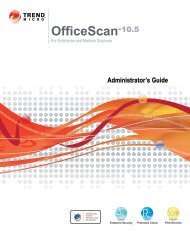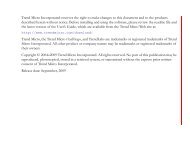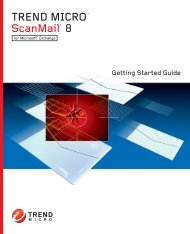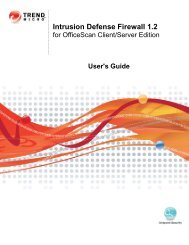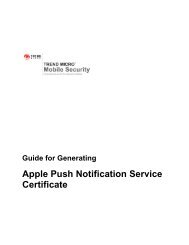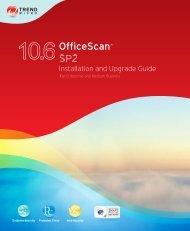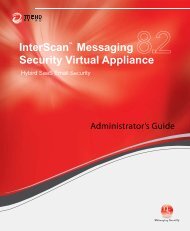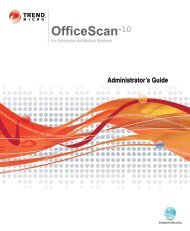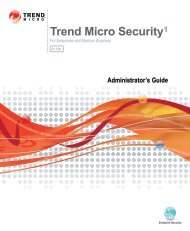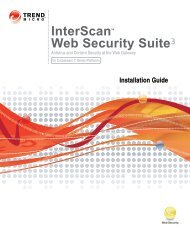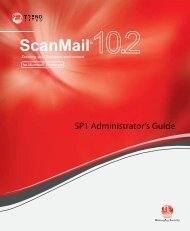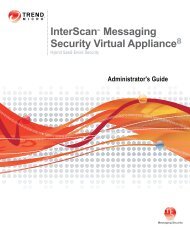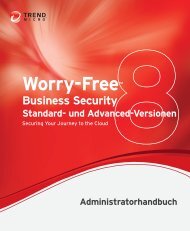- Page 1:
TM InterScan Gateway Security Appli
- Page 4 and 5:
The Trend Micro InterScan Gateway S
- Page 6 and 7:
Trend Micro InterScan Gateway Secur
- Page 8 and 9:
Trend Micro InterScan Gateway Secur
- Page 10 and 11:
Trend Micro InterScan Gateway Secur
- Page 12 and 13:
Trend Micro InterScan Gateway Secur
- Page 14 and 15:
Trend Micro InterScan Gateway Secur
- Page 16 and 17:
Trend Micro InterScan Gateway Secur
- Page 18 and 19:
Trend Micro InterScan Gateway Secur
- Page 20 and 21:
Trend Micro InterScan Gateway Secur
- Page 22 and 23:
Trend Micro InterScan Gateway Secur
- Page 24 and 25:
Trend Micro InterScan Gateway Secur
- Page 26 and 27:
Trend Micro InterScan Gateway Secur
- Page 28 and 29: Trend Micro InterScan Gateway Secur
- Page 30 and 31: Trend Micro InterScan Gateway Secur
- Page 32 and 33: Trend Micro InterScan Gateway Secur
- Page 34 and 35: Trend Micro InterScan Gateway Secur
- Page 36 and 37: Trend Micro InterScan Gateway Secur
- Page 38 and 39: Trend Micro InterScan Gateway Secur
- Page 40 and 41: Trend Micro InterScan Gateway Secur
- Page 42 and 43: Trend Micro InterScan Gateway Secur
- Page 44 and 45: Trend Micro InterScan Gateway Secur
- Page 46 and 47: Trend Micro InterScan Gateway Secur
- Page 48 and 49: Trend Micro InterScan Gateway Secur
- Page 50 and 51: Trend Micro InterScan Gateway Secur
- Page 52 and 53: Trend Micro InterScan Gateway Secur
- Page 54 and 55: Trend Micro InterScan Gateway Secur
- Page 56 and 57: Trend Micro InterScan Gateway Secur
- Page 58 and 59: Trend Micro InterScan Gateway Secur
- Page 60 and 61: Trend Micro InterScan Gateway Secur
- Page 62 and 63: Trend Micro InterScan Gateway Secur
- Page 64 and 65: Trend Micro InterScan Gateway Secur
- Page 66 and 67: Trend Micro InterScan Gateway Secur
- Page 68 and 69: Trend Micro InterScan Gateway Secur
- Page 70 and 71: Trend Micro InterScan Gateway Secur
- Page 72 and 73: Trend Micro InterScan Gateway Secur
- Page 74 and 75: Trend Micro InterScan Gateway Secur
- Page 76 and 77: Trend Micro InterScan Gateway Secur
- Page 80 and 81: Trend Micro InterScan Gateway Secur
- Page 82 and 83: Trend Micro InterScan Gateway Secur
- Page 84 and 85: Trend Micro InterScan Gateway Secur
- Page 86 and 87: Trend Micro InterScan Gateway Secur
- Page 88 and 89: Trend Micro InterScan Gateway Secur
- Page 90 and 91: Trend Micro InterScan Gateway Secur
- Page 92 and 93: Trend Micro InterScan Gateway Secur
- Page 94 and 95: Trend Micro InterScan Gateway Secur
- Page 96 and 97: Trend Micro InterScan Gateway Secur
- Page 98 and 99: Trend Micro InterScan Gateway Secur
- Page 100 and 101: Trend Micro InterScan Gateway Secur
- Page 102 and 103: Trend Micro InterScan Gateway Secur
- Page 104 and 105: Trend Micro InterScan Gateway Secur
- Page 106 and 107: Trend Micro InterScan Gateway Secur
- Page 108 and 109: Trend Micro InterScan Gateway Secur
- Page 110 and 111: Trend Micro InterScan Gateway Secur
- Page 112 and 113: Trend Micro InterScan Gateway Secur
- Page 114 and 115: Trend Micro InterScan Gateway Secur
- Page 116 and 117: Trend Micro InterScan Gateway Secur
- Page 118 and 119: Trend Micro InterScan Gateway Secur
- Page 120 and 121: Trend Micro InterScan Gateway Secur
- Page 122 and 123: Trend Micro InterScan Gateway Secur
- Page 124 and 125: Trend Micro InterScan Gateway Secur
- Page 126 and 127: Trend Micro InterScan Gateway Secur
- Page 128 and 129:
Trend Micro InterScan Gateway Secur
- Page 130 and 131:
Trend Micro InterScan Gateway Secur
- Page 132 and 133:
Trend Micro InterScan Gateway Secur
- Page 134 and 135:
Trend Micro InterScan Gateway Secur
- Page 136 and 137:
Trend Micro InterScan Gateway Secur
- Page 138 and 139:
Trend Micro InterScan Gateway Secur
- Page 140 and 141:
Trend Micro InterScan Gateway Secur
- Page 142 and 143:
Trend Micro InterScan Gateway Secur
- Page 144 and 145:
Trend Micro InterScan Gateway Secur
- Page 146 and 147:
Trend Micro InterScan Gateway Secur
- Page 148 and 149:
Trend Micro InterScan Gateway Secur
- Page 150 and 151:
Trend Micro InterScan Gateway Secur
- Page 152 and 153:
Trend Micro InterScan Gateway Secur
- Page 154 and 155:
Trend Micro InterScan Gateway Secur
- Page 156 and 157:
Trend Micro InterScan Gateway Secur
- Page 158 and 159:
Trend Micro InterScan Gateway Secur
- Page 160 and 161:
Trend Micro InterScan Gateway Secur
- Page 162 and 163:
Trend Micro InterScan Gateway Secur
- Page 164 and 165:
Trend Micro InterScan Gateway Secur
- Page 166 and 167:
Trend Micro InterScan Gateway Secur
- Page 168 and 169:
Trend Micro InterScan Gateway Secur
- Page 170 and 171:
Trend Micro InterScan Gateway Secur
- Page 172 and 173:
Trend Micro InterScan Gateway Secur
- Page 174 and 175:
Trend Micro InterScan Gateway Secur
- Page 176 and 177:
Trend Micro InterScan Gateway Secur
- Page 178 and 179:
Trend Micro InterScan Gateway Secur
- Page 180 and 181:
Trend Micro InterScan Gateway Secur
- Page 182 and 183:
Trend Micro InterScan Gateway Secur
- Page 184 and 185:
Trend Micro InterScan Gateway Secur
- Page 186 and 187:
Trend Micro InterScan Gateway Secur
- Page 188 and 189:
Trend Micro InterScan Gateway Secur
- Page 190 and 191:
Trend Micro InterScan Gateway Secur
- Page 192 and 193:
Trend Micro InterScan Gateway Secur
- Page 194 and 195:
Trend Micro InterScan Gateway Secur
- Page 196 and 197:
Trend Micro InterScan Gateway Secur
- Page 198 and 199:
Trend Micro InterScan Gateway Secur
- Page 200 and 201:
Trend Micro InterScan Gateway Secur
- Page 202 and 203:
Trend Micro InterScan Gateway Secur
- Page 204 and 205:
Trend Micro InterScan Gateway Secur
- Page 206 and 207:
Trend Micro InterScan Gateway Secur
- Page 208 and 209:
Trend Micro InterScan Gateway Secur
- Page 210 and 211:
Trend Micro InterScan Gateway Secur
- Page 212 and 213:
Trend Micro InterScan Gateway Secur
- Page 214 and 215:
Trend Micro InterScan Gateway Secur
- Page 216 and 217:
Trend Micro InterScan Gateway Secur
- Page 218 and 219:
Trend Micro InterScan Gateway Secur
- Page 220 and 221:
Trend Micro InterScan Gateway Secur
- Page 222 and 223:
Trend Micro InterScan Gateway Secur
- Page 224 and 225:
Trend Micro InterScan Gateway Secur
- Page 226 and 227:
Trend Micro InterScan Gateway Secur
- Page 228 and 229:
Trend Micro InterScan Gateway Secur
- Page 230 and 231:
Trend Micro InterScan Gateway Secur
- Page 232 and 233:
Trend Micro InterScan Gateway Secur
- Page 234 and 235:
Trend Micro InterScan Gateway Secur
- Page 236 and 237:
Trend Micro InterScan Gateway Secur
- Page 238 and 239:
Trend Micro InterScan Gateway Secur
- Page 240 and 241:
Trend Micro InterScan Gateway Secur
- Page 242 and 243:
Trend Micro InterScan Gateway Secur
- Page 244 and 245:
Trend Micro InterScan Gateway Secur
- Page 246 and 247:
Trend Micro InterScan Gateway Secur
- Page 248 and 249:
Trend Micro InterScan Gateway Secur
- Page 250 and 251:
Trend Micro InterScan Gateway Secur
- Page 252 and 253:
Trend Micro InterScan Gateway Secur
- Page 254 and 255:
Trend Micro InterScan Gateway Secur
- Page 256 and 257:
Trend Micro InterScan Gateway Secur
- Page 258 and 259:
Trend Micro InterScan Gateway Secur
- Page 260 and 261:
Trend Micro InterScan Gateway Secur
- Page 262 and 263:
Trend Micro InterScan Gateway Secur
- Page 264 and 265:
Trend Micro InterScan Gateway Secur
- Page 266 and 267:
Trend Micro InterScan Gateway Secur
- Page 268 and 269:
Trend Micro InterScan Gateway Secur
- Page 270 and 271:
Trend Micro InterScan Gateway Secur
- Page 272 and 273:
Trend Micro InterScan Gateway Secur
- Page 274 and 275:
Trend Micro InterScan Gateway Secur
- Page 276 and 277:
Trend Micro InterScan Gateway Secur
- Page 278 and 279:
Trend Micro InterScan Gateway Secur
- Page 280 and 281:
Trend Micro InterScan Gateway Secur
- Page 282 and 283:
Trend Micro InterScan Gateway Secur
- Page 284 and 285:
Trend Micro InterScan Gateway Secur
- Page 286 and 287:
Trend Micro InterScan Gateway Secur
- Page 288 and 289:
Trend Micro InterScan Gateway Secur
- Page 290 and 291:
Trend Micro InterScan Gateway Secur
- Page 292 and 293:
Trend Micro InterScan Gateway Secur
- Page 294 and 295:
Trend Micro InterScan Gateway Secur
- Page 296 and 297:
Trend Micro InterScan Gateway Secur
- Page 298 and 299:
Trend Micro InterScan Gateway Secur
- Page 300 and 301:
Trend Micro InterScan Gateway Secur
- Page 302 and 303:
Trend Micro InterScan Gateway Secur
- Page 304 and 305:
Trend Micro InterScan Gateway Secur
- Page 306 and 307:
Trend Micro InterScan Gateway Secur
- Page 308 and 309:
Trend Micro InterScan Gateway Secur
- Page 310 and 311:
Trend Micro InterScan Gateway Secur
- Page 312 and 313:
Trend Micro InterScan Gateway Secur
- Page 314 and 315:
Trend Micro InterScan Gateway Secur
- Page 316 and 317:
Trend Micro InterScan Gateway Secur
- Page 318 and 319:
Trend Micro InterScan Gateway Secur
- Page 320 and 321:
Trend Micro InterScan Gateway Secur
- Page 322 and 323:
Trend Micro InterScan Gateway Secur
- Page 324 and 325:
Trend Micro InterScan Gateway Secur
- Page 326 and 327:
Trend Micro InterScan Gateway Secur
- Page 328 and 329:
Trend Micro InterScan Gateway Secur
- Page 330 and 331:
Trend Micro InterScan Gateway Secur
- Page 332 and 333:
Trend Micro InterScan Gateway Secur
- Page 334 and 335:
Trend Micro InterScan Gateway Secur
- Page 336 and 337:
Trend Micro InterScan Gateway Secur
- Page 338 and 339:
Trend Micro InterScan Gateway Secur
- Page 340 and 341:
Trend Micro InterScan Gateway Secur
- Page 342 and 343:
Trend Micro InterScan Gateway Secur
- Page 344 and 345:
Trend Micro InterScan Gateway Secur
- Page 346 and 347:
Trend Micro InterScan Gateway Secur
- Page 348 and 349:
Trend Micro InterScan Gateway Secur
- Page 350 and 351:
Trend Micro InterScan Gateway Secur
- Page 352 and 353:
Trend Micro InterScan Gateway Secur
- Page 354 and 355:
Trend Micro InterScan Gateway Secur
- Page 356 and 357:
Trend Micro InterScan Gateway Secur
- Page 358 and 359:
Trend Micro InterScan Gateway Secur
- Page 360 and 361:
Trend Micro InterScan Gateway Secur
- Page 362 and 363:
Trend Micro InterScan Gateway Secur
- Page 364 and 365:
Trend Micro InterScan Gateway Secur
- Page 366 and 367:
Trend Micro InterScan Gateway Secur
- Page 368 and 369:
Trend Micro InterScan Gateway Secur
- Page 370 and 371:
Trend Micro InterScan Gateway Secur
- Page 372 and 373:
Trend Micro InterScan Gateway Secur
- Page 374 and 375:
Trend Micro InterScan Gateway Secur
- Page 376 and 377:
Trend Micro InterScan Gateway Secur
- Page 378 and 379:
Trend Micro InterScan Gateway Secur
- Page 380 and 381:
Trend Micro InterScan Gateway Secur
- Page 382 and 383:
Trend Micro InterScan Gateway Secur
- Page 384 and 385:
Trend Micro InterScan Gateway Secur
- Page 386 and 387:
Trend Micro InterScan Gateway Secur
- Page 388 and 389:
Trend Micro InterScan Gateway Secur
- Page 390 and 391:
Trend Micro InterScan Gateway Secur
- Page 392 and 393:
Trend Micro InterScan Gateway Secur
- Page 394 and 395:
Trend Micro InterScan Gateway Secur
- Page 396 and 397:
Trend Micro InterScan Gateway Secur
- Page 398 and 399:
Trend Micro InterScan Gateway Secur
- Page 400 and 401:
Trend Micro InterScan Gateway Secur
- Page 402 and 403:
Trend Micro InterScan Gateway Secur
- Page 404 and 405:
Trend Micro InterScan Gateway Secur
- Page 406 and 407:
Trend Micro InterScan Gateway Secur
- Page 408 and 409:
Trend Micro InterScan Gateway Secur
- Page 410 and 411:
Trend Micro InterScan Gateway Secur
- Page 412 and 413:
Trend Micro InterScan Gateway Secur
- Page 414 and 415:
Trend Micro InterScan Gateway Secur
- Page 416 and 417:
Trend Micro InterScan Gateway Secur
- Page 418 and 419:
Trend Micro InterScan Gateway Secur
- Page 420 and 421:
Trend Micro InterScan Gateway Secur
- Page 422 and 423:
Trend Micro InterScan Gateway Secur
- Page 424 and 425:
Trend Micro InterScan Gateway Secur
- Page 426 and 427:
Trend Micro InterScan Gateway Secur
- Page 428 and 429:
Trend Micro InterScan Gateway Secur
- Page 430 and 431:
Trend Micro InterScan Gateway Secur
- Page 432 and 433:
Trend Micro InterScan Gateway Secur
- Page 434 and 435:
Trend Micro InterScan Gateway Secur
- Page 436 and 437:
Trend Micro InterScan Gateway Secur
- Page 438 and 439:
Trend Micro InterScan Gateway Secur
- Page 440 and 441:
Trend Micro InterScan Gateway Secur
- Page 442 and 443:
Trend Micro InterScan Gateway Secur
- Page 444 and 445:
Trend Micro InterScan Gateway Secur
- Page 446 and 447:
Trend Micro InterScan Gateway Secur
- Page 448 and 449:
Trend Micro InterScan Gateway Secur
- Page 450 and 451:
Trend Micro InterScan Gateway Secur
- Page 452 and 453:
Trend Micro InterScan Gateway Secur
- Page 454 and 455:
Trend Micro InterScan Gateway Secur
- Page 456 and 457:
Trend Micro InterScan Gateway Secur
- Page 458 and 459:
Trend Micro InterScan Gateway Secur
- Page 460 and 461:
Trend Micro InterScan Gateway Secur
- Page 462 and 463:
Trend Micro InterScan Gateway Secur
- Page 464 and 465:
Trend Micro InterScan Gateway Secur
- Page 466 and 467:
Trend Micro InterScan Gateway Secur
- Page 468 and 469:
Trend Micro InterScan Gateway Secur
- Page 470 and 471:
Trend Micro InterScan Gateway Secur
- Page 472 and 473:
Trend Micro InterScan Gateway Secur
- Page 474 and 475:
Trend Micro InterScan Gateway Secur
- Page 476 and 477:
Trend Micro InterScan Gateway Secur
- Page 478 and 479:
Trend Micro InterScan Gateway Secur
- Page 480:
Trend Micro InterScan Gateway Secur



